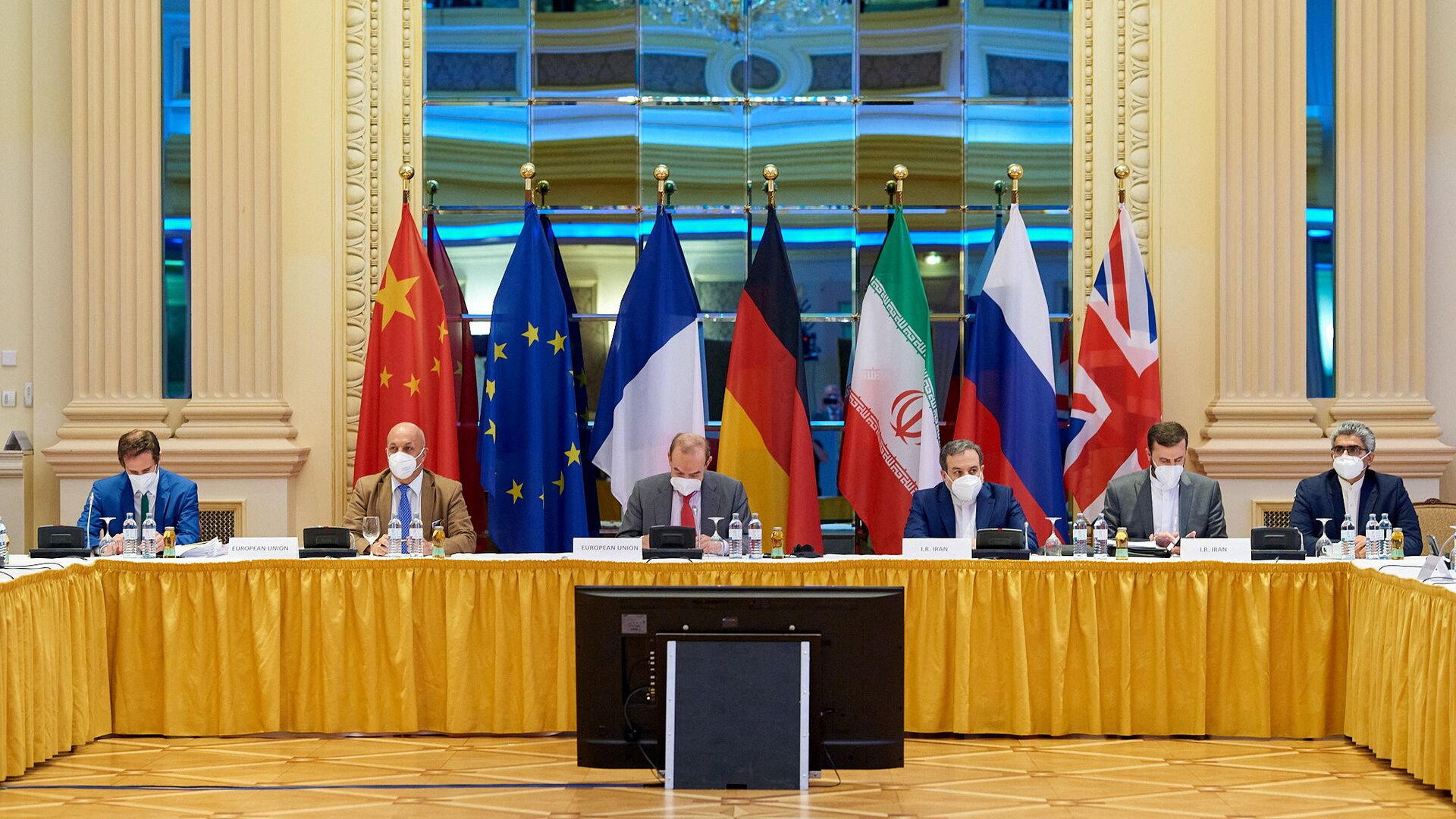https://sputnikglobe.com/20211217/us-says-understanding-on-text-of-nuclear-issues-reached-with-iran-as-7th-round-of-vienna-talks-ends-1091616377.html
US Says Understanding on Text of Nuclear Issues Reached With Iran as 7th Round of Vienna Talks Ends
US Says Understanding on Text of Nuclear Issues Reached With Iran as 7th Round of Vienna Talks Ends
Sputnik International
As the seventh round of talks on reviving the Joint Comprehensive Plan of Action (JCPOA) conclude in Vienna, Austria, the US has said that Iran's expectations are not realistic, but that "moderate progress" was nonetheless made.
2021-12-17T22:39+0000
2021-12-17T22:39+0000
2022-08-06T13:27+0000
middle east
iran
joint comprehensive plan of action (jcpoa)
vienna talks
us
https://cdn1.img.sputnikglobe.com/img/07e5/06/14/1083195777_0:108:2049:1260_1920x0_80_0_0_944da91c4336c061713bd4e5714b95a0.jpg
A senior Biden administration official said Friday that an agreement had been reached on the installation of security cameras at a key Iranian nuclear facility, as well as on the text of the deal as a whole. However, they expressed dismay that Iran chose to conclude the talks when it did, saying the US and other six parties to the 2015 deal were ready to continue their work advancing the talks.The US is willing to do whatever it takes to stop Iran from getting a nuclear weapon if diplomacy fails, the official added.No date for an eighth round of talks was announced. A six-month gap separated the seventh and sixth rounds of talks, although that was largely due to a lengthy reevaluation period following the change of administrations in Tehran, where Iranian President Ebrahim Raisi was inaugurated in August.The 2015 deal set limits on Iran's nuclear program in exchange for the lowering of economic sanctions, but the US unilaterally withdrew in 2018, claiming without evidence that Iran had been secretly violating the deal. The Trump administration reinstated "maximum pressure" sanctions and provocative military and espionage actions against Tehran, severely hurting its economy and bringing Iran and the US to the brink of war.After US President Joe Biden replaced Donald Trump in January, the US returned to the negotiating table with Iran, but has pushed for a more restrictive deal than before amid pressure by Israel, Saudi Arabia, and other US partners in the region.
iran
Sputnik International
feedback@sputniknews.com
+74956456601
MIA „Rossiya Segodnya“
2021
News
en_EN
Sputnik International
feedback@sputniknews.com
+74956456601
MIA „Rossiya Segodnya“
Sputnik International
feedback@sputniknews.com
+74956456601
MIA „Rossiya Segodnya“
iran; us; jcpoa; vienna talks; nuclear deal
iran; us; jcpoa; vienna talks; nuclear deal
US Says Understanding on Text of Nuclear Issues Reached With Iran as 7th Round of Vienna Talks Ends
22:39 GMT 17.12.2021 (Updated: 13:27 GMT 06.08.2022) As the seventh round of talks on reviving the Joint Comprehensive Plan of Action (JCPOA) conclude in Vienna, Austria, the US has said that Iran's expectations are not realistic, but that "moderate progress" was nonetheless made.
A senior Biden administration official said Friday that an agreement had been reached on the installation of security cameras at a key Iranian nuclear facility, as well as on the text of the deal as a whole. However, they expressed dismay that Iran chose to conclude the talks when it did, saying the US and other six parties to the 2015 deal were ready to continue their work advancing the talks.
The US is willing to do whatever it takes to stop Iran from getting a nuclear weapon if diplomacy fails, the official added.
Earlier this week, Tehran and the International Atomic Energy Association (IAEA), the UN's nuclear watchdog,
reached an agreement on installing cameras at the Karaj research facility after an
attack by agents of Israel's Mossad intelligence agency damaged them earlier this year.
No date for an eighth round of talks was announced. A six-month gap separated the seventh and sixth rounds of talks, although that was largely due to a
lengthy reevaluation period following the change of administrations in Tehran, where Iranian President Ebrahim Raisi was inaugurated in August.
The 2015 deal set limits on Iran's nuclear program in exchange for the lowering of economic sanctions, but the US unilaterally withdrew in 2018, claiming without evidence that Iran had been secretly violating the deal. The Trump administration reinstated "maximum pressure" sanctions and provocative military and espionage actions against Tehran, severely hurting its economy and bringing Iran and the US to the brink of war.
As a consequence, Tehran began reducing its commitments to the deal, as the deal itself allows, increasing the quality and quantity of uranium-235 they refined. However, as per a 2009 ruling by Ayatollah Ali Khamenei, Iran's top legal and political authority, the country has foresworn nuclear weapons and all weapons of mass destruction as being a violation of Islam's moral precepts.
After US President Joe Biden replaced Donald Trump in January, the US returned to the negotiating table with Iran, but has pushed for a more restrictive deal than before amid pressure by Israel, Saudi Arabia, and other US partners in the region.

